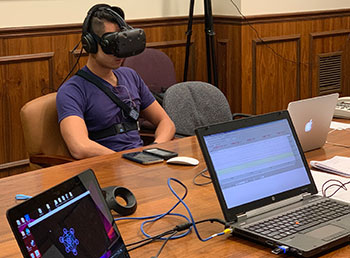Project Breathe: Promoting sustainable mental wellness for residents through virtual reality

By Jennifer Stranges

The setup of the Project Breathe immersion experience
It was while pausing mid-way during his Plastic and Reconstructive Surgery residency at St. Michael’s Hospital that Dr. Tomas Saun got the peace and quiet he didn’t know he was missing.
“It wasn’t really until I stepped out that I realized how demanding it was,” said Dr. Saun of his break to pursue a master’s degree in Biomedical Engineering during his junior residency experience.
“The hospital can be such a busy, distracting and noisy environment. When you’re on call you can’t really escape it. And for a lot of us, there’s a real mental health impact.”
Concerned by the growing statistics of substance abuse, depression and suicide among trainee physicians — as outlined in a recent survey by the Canadian Medical Association — and inspired by his break from the clinical setting, Dr. Saun set out to address the issue through Project Breathe, a study that uses virtual reality (VR). It provides on-call resident physicians with an escape from the chaos and sensory-overload of the hospital environment. The study monitors the stress levels of participating on-call residents before, during, and after the VR immersion experience.
Dr. Saun was first introduced to VR in early 2017, during the time he was pursuing his master’s. He attended South by Southwest (SXSW), an interdisciplinary conference in Austin, Texas, where he was introduced to LUMEN, a VR application collaboratively created by Stanford neuroscientists, a Time magazine editor and in collaboration with a Hollywood visual effects studio. Users are guided through breathing exercises and are immersed in a simulated forest environment with calming music.
“Seeing the technology in Austin and its potential for pain and stress reduction for patients, I was really impressed,” said Dr. Saun. “I thought how great this would be not just for patients at the hospital, but also for physicians. If we could experience this even just for five minutes during a shift, what would be the benefits?”
Dr. Saun identified mentors to help champion the project, including Dr. Karen Cross, a plastic, reconstructive and aesthetic surgeon at St. Michael’s. Dr. Cross is also the director of Resident Wellness. They established a larger team who developed subjective and objective methods of measurement for the study, including a pre and post-immersion questionnaire for participants, as well as assessment of heart rate variability, breathing patterns and sweat skin tests. Project Breathe was approved by the Unity Health Toronto Research Ethics Board and is currently underway at St. Michael’s Hospital.
Project Breathe collects the findings of resident physicians of any specialty who are on-call after hours at St. Michael’s. Participants complete the pre-immersion questionnaire to reflect on their current stress levels, are set up with the monitoring equipment for a baseline reading, and begin the VR experience while wearing noise-cancelling headphones and a VR headset. Physiological responses are monitored throughout the experience, which concludes with a post-immersion questionnaire.
Dr. Saun says initial data shows decreased heart rates and breathing rates among participants while in the VR immersion experience. While the data appears to be promising, the effects of the experience don’t appear to be sustained. As residents return to the clinical setting from the immersion experience, so do their heightened stress levels. A sustained response is ideal in addressing mental wellness, however Dr. Saun believes that addressing stress in the environment it’s produced in is significant.
Dr. Scott Odorizzi is a fourth year emergency medicine resident and agrees that resident burnout is a very real experience.
“Residents work long hours and during unfavourable times such as weekends, overnight, and holidays. All of this digs away at any attempt at setting a routine which includes eating well, exercising, and getting sleep when you should be sleeping.”
As one of the participants of the Project Breathe study, Dr. Odorizzi credits the initiative as a welcome change to the traditional methods used to address mental wellness for resident physicians, such as retreats.
“Being given a chance to work through a mindfulness session in the middle of a shift was a great way to step back and relax, even briefly, from a hectic night shift.”
There are plans for Project Breathe to test more residents before Dr. Saun reviews the data and publishes his findings.
“I hope that we can say that this intervention improves acute stress parameters in on-call resident physicians. I want to continue exploring evidence-based wellness interventions so that myself, my colleagues, and ultimately patients, have the best experience possible.”
About St. Michael’s Hospital
St. Michael’s Hospital provides compassionate care to all who enter its doors. The hospital also provides outstanding medical education to future health care professionals in more than 27 academic disciplines. Critical care and trauma, heart disease, neurosurgery, diabetes, cancer care, care of the homeless and global health are among the Hospital’s recognized areas of expertise. Through the Keenan Research Centre and the Li Ka Shing International Healthcare Education Centre, which make up the Li Ka Shing Knowledge Institute, research and education at St. Michael’s Hospital are recognized and make an impact around the world. Founded in 1892, the hospital is fully affiliated with the University of Toronto.
About Unity Health Toronto
Unity Health Toronto, comprised of Providence Healthcare, St. Joseph’s Health Centre and St. Michael’s Hospital, works to advance the health of everyone in our urban communities and beyond. Our health network serves patients, residents and clients across the full spectrum of care, spanning primary care, secondary community care, tertiary and quaternary care services to post-acute through rehabilitation, palliative care and long-term care, while investing in world-class research and education. For more information, visit www.unityhealth.to.
